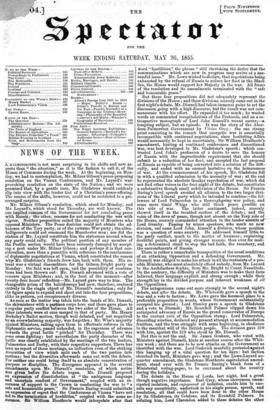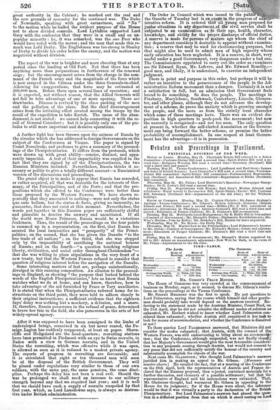NEWS OF THE WEEK.
A KALEIDOSCOPE is not more surprising in its shifts and new as- pects than " the situation," as it is the fashion to call it, of the House of Commons during the week. At the beginning, on Mon- day, we had in contemplation, Mr. Milner Gibson's peace-proposing resolution on the Vienna donferenoes, and Mr. Layard's war- provoking resolution on the state of the- Nation ; and we were proiaised that, by a gentle turn, Mr. Gladstone would suddenly slip into view with the tender tint of a Christian's peace-offering. The course of the shifts, however, could not be restricted to a pre- arranged surprise.
Mr. Milner Gibson's resolution, which stood for Monday, and Mr. Layard's, which stood for Thursday, are well known. The one implied censure of the Government for not concluding peace with Russia; the other, censure for not conducting the war with -vigour. Neither proposition suited the majority of Members who opposed Ministers. The Peace doctrine could not obtain the ad- herence of the Tory party, or of the extreme War party ; the ultra- belligerents could not command the Manchester men ; nor did the station of Mr. Layard constitute him the statesman around whom any party could rally. The political position of any member of the Peelite section would have been seriously damaged by accept- ing a post under Mr. Milner Gibson ; and perhaps it is that con- sideration, more than a punctilio with reference to the continuance of diplomatic negotiations at Vienna, which constituted the reason whje-Mr. Gladstone's friends drew him bank with them. His re- treat was a virtual discomfiture for the Gibson-Bright party on Monday : the field was left open, and the possibility of combina- tions had been thrown out: Mr. Disraeli advanced with a vote of censnre upon Ministers • and, in the heat of the moment—after twenty-four hours' reflection-Mr. Layard gave way to him. The changeable prism of the kaleidoscope had now, therefore, centered entirely in the single object of Mr. Disraeli's resolution ; only for the figure again to expand and shoot out into the four propositions, alike in pattern, yet conspicuously diverse. As soon as the matter was taken into the hands of Mr. Disraeli the skirmishers with a partisan corps here and there gave place te a regular party conflict between the two sides of the House. All other interests were at once merged in that of party. Mr. Henry Berkeley's Ballot motion, though well debated, and not negatived by an overwhelming majority, was forgotten ; Mr. Wise's majority against Ministers, calling upon them to effectuate reforms in the Diplomatic service, passed unheeded, in the eagerness of advance towards the great battle " pitched" for Thursday. There was some cross fighting; but nevertheless the party character of the battle was Clearly established by the meetings of the two leaders, Palmerston and Derby, with their respective supporters. There has been no report of those meetings, no indication even of the striking diversities of view which split each of the two parties into sections; but the diversities afterwards came out with the debate. For neither one could bring itself to an absolute concentration of purpose or discipline. The divergence appeared in the several amendments upon Mr. Disraeli's resolution, of which notice Was given before the debate began. Mr. Disraeliproposed an expression of dissatisfaction at " the ambiguous language and uncertain conduct of Government," coupled with an as- surance of support to the Crown in conducting the war to " a safe and honourable peace." Sir Francis Baring would substitute an expression of regret that the Conferences at Vienna "have not led to the termination of hostilities," coupled with the same as- surance. Si William Heathcote would interpolate after that
word "hostilities," the phrase "still cherishing the desire that the communications which are now in progress may arrive at a eue- oessful issue." Mr. Lowe wished to declare, that negotiations being exhausted by the refusal of Russia to reduce her fleet in the Black Sea, the House would support her Majesty in the war. All forms of the resolution and its amendments terminated with the "safe and honourable peace."
• But these four propositions did not adequately represent the divisions of the House ; and those divisions scarcely came out in the first night's debate. Mr. Disraeli had taken immense pains to set the discussion going with a high discourse, but the result was not com- mensurate with his effort. He expanded it too much; he wasted words on commented recapitulations of the Protocols, and on a re- trospective monograph of Lord John Russell's recent career —a tempting subject, but an episode. It was the story of the Aber- deen-Palmerston Government by Vivian Grey : the one strong point consisting in the remark that energetic war is essentially incompatible with continued negotiations, since hesitating Allies would necessarily be kept in uncertainty. Sir William Heathoote's amendment, hinting at continued conferences and discontinued war, was best developed in Mr. Gladstone's speech ; which con- trasted Lord John's profession of a desire to save the honour of Russia with the impracticable requirement that she should submit to a reduction of her fleet, and accepted the last proposal of Russia as capable of being converted into a solution of the diffi- culty, and ended with an earnest hortative on the heinousness of war. At the commencement of his speech, Mr. Gladstone fell in with a qualified submission to the necessity of war; at the end he represented the absolute Quaker reprobation of war, which did not find other voices in the first night of the debate, but constitutes a substantive though small subdivision of the House. Sir Francis Baring's level speech avoided all allusion to the two larger divi- sions of the Liberal party which he intended to combine—the fol- lowers of Lord Palmerston in a thoroughgoing war policy, and some more timid Whigs who still think peace possible on
this side of war. The latter sentiment, indeed, scarcely showed itself in the troubled surface of the debate ; and the voice of the dove of peace, theugh_not absent-on the =Tory side of the House, scarcely commanded attention in the tender accents of Lord Granby. Passing by minor speakers, who mark no new division, out came Lord John, himself a division, whose position was a question of some anxiety. He addressed himself little to the party conflict, much to the matter of business ; explaining doubtful points, and giving stronger reasons than ever for mak- ing a determined stand to stop the bad faith, the treachery, and the encroachments of Russia.
There is rather a remarkable transposition of the usual conditions of an attacking Opposition and a defending Government. Mr. Disraeli was obliged to make his attack in all the restraints of a pos- sible Minister, who must absolutely offend nobody, from Mr. Layard to the Archduchess Sophia, from Mr. Bright to Count Nesselrode. On the contrary, the difficulty of Ministers was to make their facts believed, their language explicit and strong enough ; while their strength lay in the divided purpose and inherent weakness of all the Oppositions. The antagonisms came out more strongly in the second night's debate, and after the debate. Mr. Whiteside gave a speech to the war and a vote to faction ; Mr. Lowe gave the foremost place to a preferable proposition in words, where Government substantially occupied his ground ; Lord Stanley gave a speech to Gladstone and a vote to Disraeli; Mr. Roundell Palmer clipped down his anticipated advocacy of Russia as the grand conservator of Europe to the current coin of the Opposition stamp ; Lord Palmerston, discarding niceties, declared any present attempt at accommodation fruitless, and the true struggle with arms beginning, in obedienceto the manifest will of the British people. The division gave 319
with him, against the 219 who stood by Mr. Disraeli. But this is not the end. Sir James Graham, who voted with Ministers against Disraeli, hints at another course after the Whit- son week ; and there are to be new attacks on the Government as identified with the war. Lord Goderich manfully protested against this hanging up of a vital question for ten days : but faction clenched its teeth, Ministers gave way; and the Lowe-Layard no- quarter amendment, the Gladstone-Heathoote capitulation amend- ment, stand over with Sir Francis Baring's blank form of a Ministerial voting-paper, to be canvassed about the country during the holidays.
The debate in the House of Lords, last night, had a great though negative importance. Earl Grey, whose cleverness, eman- cipated isolation, and enjoyment of isolation, enable him to exe- cute any eccentricity, undertook in his single person, speech, and resolution, all that could have been done in the other House by its Gladstones, its Cobdens, and its Roundell Palmers. In refuting him, Lord Clarendon added to these debates the other great authority in the Cabinet; he marked out the real and of Newcastle, speaking with great earnestness, said "No " to the motion while he 'hailed the evident purpose of the House not to show divided councils. Lord Lyttelton supported Lord the new grounds of necessity for the continued war. The Duke Grey with the confession that they were in a small and an un- popular minority : he, it was remarked, was the one Peer who would have voted with the mover; and the man that made this re- negatived without division.



































 Previous page
Previous page